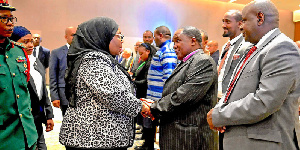Africa News of Tuesday, 18 July 2023
Source: theeastafrican.co.ke
Samia: Why Africa is back-pedalling on democracy
President Samia Suluhu Hassan yesterday expressed her concern about the regressing democratic gains in Africa.
Over 60 years after independence of most countries, the continent is still prone to military coups and other forms of removal of democratically elected leaders.
"The regressive factors have undoubtedly disrupted the democratic processes,” she noted when she opened the Elders' Forum on the State of Democracy in Africa.
According to her, out of the 55 African Union (AU) member states, 21 of them have been subjected to military coups or attempted coups since 2010.
The military takeovers and attempted coups have not only disrupted democratic processes but often sparked geopolitical conflicts among neighbours.
Failure to observe the democratic ideals will derail 'The Africa We Want Agenda 2063', a blueprint and masterplan for transforming Africa into a global powerhouse of the future.
Besides internal conflicts, regressing democracy has also been attributed to spiralling debts "and failure by governments to deliver basic services and goods".
President Hassan challenged the African leaders to embrace democracy by listening to dissenting voices and in so doing erase the historical injustices.
"For democracy to be meaningful, it should improve the livelihood of our people,” she here yesterday.
She said the sixth phase government has struggled to consolidate democracy through reconciliation, reforms, resilience and rebuilding.
According to her, the initiative has paid off in that "we have managed to resolve some of our differences and enhanced national cohesion".
In consolidating democracy, a number of reforms have been taken including review of legislations, including criminal justice whose report was handed over to her last week.
"In rebuilding, we are keen to steer Tanzania to prosperity by learning, skills, job creation and a blue economy,” she pointed out.
In the same vein, the government has instituted corrective measures in financial discipline as part of spirited fight against corruption
On his part, Retired President Jakaya Kikwete said some African leaders were to blame for persistent conflicts in their respective countries.
This, according to him, was due to their failure in the nation building agenda right after their independence from colonial rulers.
Most of the conflicts being witnessed today in the African continent can be attributed "in one way or another to the failures in the nation building agenda".
Many development, democracy and governance indices indicate that many African countries continue to be at the bottom half of the list.
Mr Kikwete was categorical that the situation has to change, lest the African continent will continue to be the least performer in democratic governance.
"As a former leader, myself, I can rightly testify that African leaders have a potential role to play in addressing these challenges…It is their primary responsibility but I believe also that the former leaders can play a role in this regard. They are both connected with both the past and the present,” he said.
Among the retired leaders in attendance at the forum were Ernest Koroma and former president of Sierra Leone and Hailemariam Desalegn, former prime minister of Ethiopia.
The former Mozambican president Joaquim Chissano was expected to join the conversation at the meeting venue later in the day, the organizers said.
Mr Kikwete told the forum that most of the challenges currently facing African countries are a continuum of what has been happening in the past.
He said although most of the early independence leaders were keen on establishing democratic governance systems, some of them did not succeed.
"Each country has a different story to tell as far as the nation building project is concerned. But I can dare say we in Tanzania have been somewhat lucky,” he said.
He attributed this to efforts made by the Nation Founder Mwalimu Julius Nyerere and his Zanzibar counterpart Sheikh Abeid Amani Karume.
"They laid a firm and strong foundation upon which successive generations of leaders and governments continued to advance the nation building project,” he added.
However, Mr Kikwete, the Union President from 2005 to 2015, hinted that even with some governance gains, Tanzania was still facing a number of challenges to put its house in order.
There are still many challenges, he observed, that "we need to continue working on to consummate the goal of a united, stable and democratic and prosperous nation".
Former Sierra Leone president Ernest Koroma and chair of The African Drive for Democracy said he was worried by the raging conflicts in Africa.
He cited the bloody war in Sudan pitting warring forces and others in Somalia, eastern DR Congo, Central African Republic (CAR), Nigeria and other areas.
He said there was no contention that the challenges in question have been aggravated poverty, hunger “and rampant decline of democracy manifested in state capture”.
Mr Koroma, who stepped down a few years ago as Sierra Leone leader, regretted that many African governments remain allergic to the opposition and the dissenting voices.
The state organs in many countries continue to suppress the people they are supposed to protect. These, according to him, include the civil society bodies and the media.
He argued that something has to be done to halt what he described as "democratic decline" in the African continent. The effort needs a strong collaboration of like minds of advocates of good governance and democracy and the regional bodies.
Former Ethiopian prime minister Hailemariam Desalegn said a lasting peace in Africa will not be achieved using armaments but through democratic processes.
He cautioned that the western democratic model was not necessarily workable in Africa due to, among others, low income levels in the latter communities.
Entertainment










